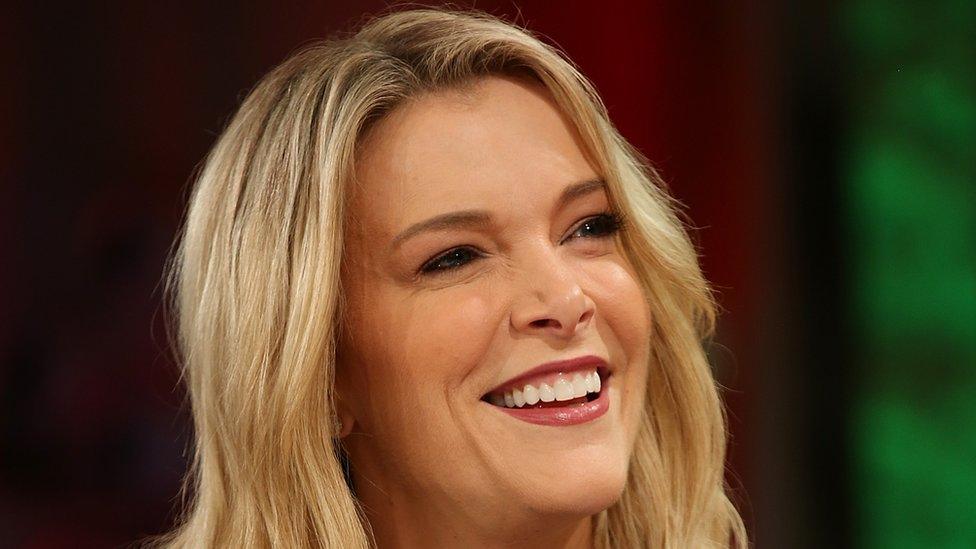Journalist Megyn Kelly criticised for blackface comments
- Published

Megyn Kelly is a presenter for NBC in the US
American TV journalist Megyn Kelly is being criticised on social media for questioning why blackface is racist.
The former lawyer asked, "What is racist?" in a discussion about inappropriate Halloween costumes during a Tuesday morning episode of NBC's "Megyn Kelly Today".
"Back when I was a kid, that was okay just as long as you were dressing as a character," she said, referring to white people painting their faces black for Halloween.
Allow X content?
This article contains content provided by X. We ask for your permission before anything is loaded, as they may be using cookies and other technologies. You may want to read X’s cookie policy, external and privacy policy, external before accepting. To view this content choose ‘accept and continue’.
After strong criticism online, Kelly emailed colleagues to apologise, writing: "The history of blackface in our culture is abhorrent; the wounds too deep."
Blackface has a history of perpetuating offensive and racist stereotypes of African Americans dating back more than 200 years in the United States.
"It's a tradition rooted in racism which is very much about the fear of black people and the laughing at black people," Dr Kehinde Andrews, Associate Professor in Sociology at Birmingham City University told the BBC in June.
Many on Twitter took the opportunity to explain why blackface is widely considered offensive.
"Open up a history book. White people used to paint their faces black and act out ridiculous black characters during the Jim Crow era," wrote user Annabel Lee, external.
Many suggested that dressing up to imitate African Americans stopped being acceptable in the 1950s, and questioned whether it had been appropriate when Kelly was a child.
Allow X content?
This article contains content provided by X. We ask for your permission before anything is loaded, as they may be using cookies and other technologies. You may want to read X’s cookie policy, external and privacy policy, external before accepting. To view this content choose ‘accept and continue’.
Others questioned why a group of white commentators would have a discussion on blackface at all without the perspectives of African-American commentators.
Allow X content?
This article contains content provided by X. We ask for your permission before anything is loaded, as they may be using cookies and other technologies. You may want to read X’s cookie policy, external and privacy policy, external before accepting. To view this content choose ‘accept and continue’.
"I just don't think it's white people's place to tell us whether we can be offended over blackface or not. Especially since blackface has never been used against them to dehumanise and oppress them systematically," wrote user Bella Goth.
However, others suggested that it should be common knowledge that the practice is inappropriate.
"I've seen comments that blast NBC for not having a black person on the panel, but honestly, minstrel shows and blackface were a popular form of extremely racist mass entertainment in America through the early 20th century. People who comment for a living should know that," wrote journalist Jamelle Bouie.
Allow X content?
This article contains content provided by X. We ask for your permission before anything is loaded, as they may be using cookies and other technologies. You may want to read X’s cookie policy, external and privacy policy, external before accepting. To view this content choose ‘accept and continue’.
Some called on NBC to cancel the Megyn Kelly show, writing "this is not only tone deaf, she's flat out racist. I was not raised to think blackface was OK and I'm 46, from small town Pennsylvania," wrote @Seanbaby.
Others recalled when Kelly made headlines in 2013 for stating it is "historical fact" that Jesus Christ, a man born in the Middle East, was white, adding that Father Christmas is too.
Allow X content?
This article contains content provided by X. We ask for your permission before anything is loaded, as they may be using cookies and other technologies. You may want to read X’s cookie policy, external and privacy policy, external before accepting. To view this content choose ‘accept and continue’.
By Georgina Rannard, BBC UGC & Social news